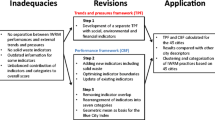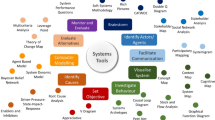Abstract
Sustainability indicators have become popular as a tool for the assessment of sustainable development in different sectors in society, including the urban water sector. For urban water management several sets of indicators have been suggested, using frameworks based on sectors such as drinking water, wastewater and stormwater, or domains such as social, economic and environmental issues. Still, these approaches have some major drawbacks; they have a limited system definition, they are mainly focused on technical systems performance emphasizing a distance to target-perspective, and they focus upon different kinds of impact assessments. This paper presents a different framework for the assessment of sustainable stormwater systems in order to be used in planning and in comparisons between the different available options. It is a re-framing based on systems theory focusing on general systems characteristics instead of a case-specific target to reach. The advantage of this kind of indicator framework is that it relies on the perspective that sustainability cannot be measured on one quantitative scale, that the possibilities of formal comprehensive aggregation are limited, and that a system as such cannot be judged as sustainable without consideration of its surroundings. The indicators presented here can be altered and adjusted to case-specific conditions; they are not as important as the time-and-place-independent framework guiding the assessments.


Similar content being viewed by others
References
Ashley R, Hopkinson P (2002) Sewer systems and performance indicators—into the 21st century. Urban Water 4:123–135
Balkema A, Wiejers SR, Lambert FJD (1998) On methodologies for comparison of wastewater treatment systems with respect to sustainability. Proceedings WIMAK Congress on Options for Closed Water Systems, Wageningen, The Netherlands, 11–13 March
Boller M (1997) Tracking heavy metals reveals sustainability deficits of urban drainage systems. Water Sci Technol 35(9):77–87
Bossel H (1998) Earth at a crossroads. Paths to a sustainable future. Cambridge University Press, Cambridge
Bossel H (1999) Indicators for sustainable development: theory, method, applications. IISD, International Institute for Sustainable Development
Brown R, Ryan R (2001) The source control paradox: professionalism, knowledge and expertise. Proceedings from NOVATECH 2001, pp 683–690
Butler D, Parkinson J (1997) Towards sustainable urban drainage, Water Sci Technol 35(9): 53–63
Checkland P, Scholes J (1999) Soft systems methodology in action. Wiley, New York
CSD (Commission on Sustainable Development) (1996) Indicators for sustainable development: framework and methodologies. United Nations. http://www.un.org/esa/sustdev/isd.htm
Dechesne M (2000) Infiltration of stormwater. Proceedings from 15th European Junior Scientist Workshop, Decision support for urban water management, pp 69–75
EEA (2000) European Signals 2000—European Environment Agency regular indicator report. European Environment Agency, Copenhagen
EEA (2001) Sustainable water use in Europe. Part 2: Demand management. Environmental issue report no 19. European Environment Agency, Copenhagen
Ellis JB, Revitt DM, Harrop DO, Beckwith PR (1987) The contribution of highway surfaces to urban stormwater sediments and metal loading. Sci Total Environ 59:339–349
Hardi P, Barg S (1997) Measuring sustainable development: Review of current practice. Occasional paper number 17. Industry Canada, Ottawa, Ontario, Canada
Hardi P, Zdan T (1997) Assessing sustainable development—principles in practice. International Institute for Sustainable Development, Winnipeg
Hellström D, Jeppsson U, Kärrman, E (2000) A framework for systems analysis of sustainable urban water management. Environ Impact Assess Rev 20(3):311–322
Hjerpe M, Krantz H (2001) Handling of stormwater in open structures: a case study of critical factors for sustainability. Proceedings IWA 2001 Berlin World Water Congress, Berlin, Germany, 15–19 October
Kain J-H (2000) Urban support systems. social and technical, socio-technical or sociotechnical? Department of Built Environment and Sustainable Development, Report 2000:3. Chalmers University of Technology, Gothenburg
Lindholm OG, Nordeide T (2000) Relevance of some criteria for sustainability in a project for disconnecting storm runoff. Environ Impact Assess Rev 20(3):413–423
Lundin M (1999) Assessment of the environmental sustainability of urban water systems. Department of Technical Environmental Planning, Report 1999:7. Chalmers University of Technology, Gothenburg
Lundin M (2003) Indicators for measuring the sustainability of urban water systems—a life cycle approach. Department of Environmental Systems Analaysis, Report 2003:1. Chalmers University of Technology, Gothenburg
Lundin M, Molander S, Morrison GM (1999) A set of indicators for the assessment of temporal variations in the sustainability of sanitary systems. Water Sci Technol 39(5):235–242
Lundqvist U (2000) On sustainability indicators and sustainable product development. Department of Physical Resource Theory, Chalmers University of Technology, Gothenburg
Maclaren V (1996) Urban sustainability reporting. J Am Planning Assoc 62(2):184–203
Malmqvist P-A (1984) Urban stormwater pollutant sources. Department of Sanitary Engineering, Chalmers University of Technology, Gothenburg
Marten GG (2001) Human ecology—basic concepts for sustainable development. Earthscan, London
Niemczynowicz J (1999) Urban hydrology and water management—present and future challenges. Urban Water 1:1–14
Norrström AC, Jacks G (1998) Concentration and fractionation of heavy metals in roadside soils receiving de-icing salts. Sci Tot Environ 218:161–174
Pitt R (1985) Characterising and controlling urban runoff through street and sewerage cleaning. EPA/600/S2-85/038. US Environmental Protection Agency, Water, Engineering Research Laboratory, Cincinnati
Rauch W (2001) REBEKA—a software tool to plan urban drainage measures based on the predicted impacts on the receiving waters. Proceedings NOVATECH, pp 265–272
Ravetz J (2000) City-region 2020. Integrated planning for a sustainable environment. Earthscan, London
Rijsberman M A, van de Ven FHM (2000) Concepts and approaches to sustainable development in urban water management. Proceedings of 8th International Conference on Urban Storm Drainage, Sydney, Australia, 30 Aug–3 Sept 1999, vol 1, pp 42–49
Spangenberg J (2002) Institutional sustainability indicators: an analysis of the institutions in Agenda 21 and a draft set of indicators for monitoring their effectivity. Sustainable Dev 10:103–115
UNSD (2002) World Summit on Sustainable Development—2002 Country Profile format. United Nations Sustainable Development, http://www.un.org/esa/agenda21/natlinfo/niau/csd10/cp_format_en.doc
UNSEC (United Nations System-wide Earthwatch Coordination) (1998) Current Status of Indicator Work, United Nations Environment Programme 1999
Valentin A, Spangenberg JH (2000) A guide to community sustainability indicators. Environ Impact Assess Rev 20:381–392
WCED (1987) Our common future. World Commission on Environment and Development, Oxford University Press, Oxford
Acknowledgement
This interdisciplinary work became possible through financial support from MISTRA, The Swedish Foundation for Strategic Environmental Research, which is gratefully acknowledged.
Author information
Authors and Affiliations
Corresponding author
Rights and permissions
About this article
Cite this article
Sundberg, C., Svensson, G. & Söderberg, H. Re-framing the assessment of sustainable stormwater systems. Clean Techn Environ Policy 6, 120–127 (2004). https://doi.org/10.1007/s10098-003-0227-6
Received:
Accepted:
Published:
Issue Date:
DOI: https://doi.org/10.1007/s10098-003-0227-6




